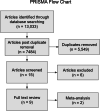ADHD Prescription Medications and Their Effect on Athletic Performance: A Systematic Review and Meta-analysis
- PMID: 35022919
- PMCID: PMC8755863
- DOI: 10.1186/s40798-021-00374-y
ADHD Prescription Medications and Their Effect on Athletic Performance: A Systematic Review and Meta-analysis
Abstract
Background: Stimulant medications used for the treatment of Attention Deficit-Hyperactivity Disorder (ADHD) are believed to provide a physical advantage in athletics, but several of these medications are not regulated by the World Anti-Doping Association. Given the prevalence of ADHD among the athlete population and concern for abuse of ADHD medications, this review and meta-analysis aimed to evaluate effects of ADHD medications on athletic performance, thereby appraising the validity of claims of performance enhancement.
Methods: A search of MEDLINE, Embase, CINAHL, and Cochrane Review databases was performed for all randomized controlled trials evaluating athletic performance after ingestion of placebo or ADHD treatment medications from August 2020 through November 2020. All RCTs identified from these search criteria were included for screening, with exclusion of any animal studies. Two reviewers (JB, CK) assessed methodological quality and risk of bias using CONSORT 2010 and Cochrane Collaboration tools. Study results were compiled with corresponding p values for each finding. Effect sizes (Cohen's D) for athletic performance and physiological changes were aggregated for each study. Studies were further screened for homogeneity that would allow for meta-analysis. Heterogeneity was calculated using I2.
Results: A total of 13,033 abstracts evaluating amphetamine, methamphetamine, methylphenidate, and bupropion were screened. The final analysis included nine studies, six of which found significant improvement in athletic performance with use of stimulant medications (p < 0.05). Methylphenidate and amphetamine were consistently identified to have a performance effect. Secondary effects identified included significant increase in heart rate, core temperature, and elevation of various serum hormone levels (p < 0.05). Effect size evaluation found seven studies demonstrating small to large effects on physical performance, as well as in categories of cardiometabolic, temperature, hormone, and ratings of perceived exertion, to varying degrees. A meta-analysis was performed on two studies, demonstrating conflicting results.
Conclusions: Dopaminergic/noradrenergic agonist medications appear to have a positive effect on athletic performance, as well as effects on physiological parameters. Further consideration of medications currently not regulated, i.e. bupropion, is warranted given evidence of athletic performance enhancement. PROSPERO trial registration number: CRD42020211062; 10/29/2020 retrospectively registered.
Keywords: ADHD; Adderall; Athlete; Bupropion; Ergogenic effect; Methamphetamine; Methylphenidate; Performance; Sports; Stimulants.
© 2021. The Author(s).
Conflict of interest statement
Jenny Berezanskaya, William Cade, Thomas Best, Kristopher Paultre and Carolyn Kienstra declare that they have no competing interests with the content of this article.
Figures
References
-
- CDC. Data and statistics about ADHD. (2020, November 16). Retrieved March 12, 2021, from https://www.cdc.gov/ncbddd/adhd/data.html
Publication types
LinkOut - more resources
Full Text Sources
Research Materials



